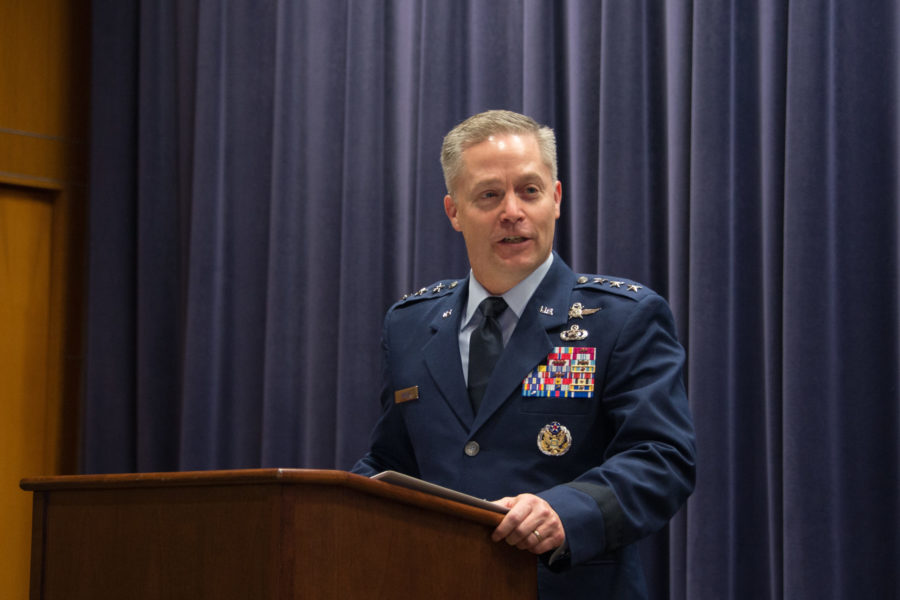With 36,000 cybersecurity job vacancies across government, the cybersecurity human capital crisis has been called a national security threat. But Lt. Gen. Timothy D. Haugh, commander of 16th Air Force, a key cyber command, says he has all the people he needs.
“We have the Airmen we need in our force,” he told a media roundtable at AFA’s Air, Space & Cyber Conference. “We have the right talents. We have the right skills. … We have the right Airmen, and being able to apply them to the right problems is a key area of work.”
In fact, Haugh said, he hasn’t needed to use new direct commissioning authorities approved by Congress.
“The National Defense Strategy told us first and foremost: Do better with what you have,” Haugh said. “So we’ve really taken that to heart.” The Air Force prioritized cutting-edge cyber and information operations capabilities and matched that with investments in recruiting and training.
“We’ve created some of the capacity to do operations in the information environment [through] decisions we made to stop doing other things and invest in [cyber and information operations capabilities],” Haugh said. While the leaders of civilian cyber agencies use social media on a near-daily basis to implore cyber defenders to join them, the main problem Haugh faces in human capital terms is keeping the talent he had trained and developed, he said. “When I say we have the Airmen we need, I’m really saying we have the talent. You’ve got to be able to retain that. And there’s no doubt that is a challenge within the career fields we have in 16th Air Force.”
Trained cyberwarriors could easily double or even triple their salaries by moving to the private sector, Haugh said. But making sure his workforce gets training and hands-on experience with the latest cyber tools helps keep people interested. “We want to ensure that they know we’re investing in them, they know we’re going to give them world-class training,” he said. “And we have to continue to enhance our infrastructure so it’s world-class and is able to adapt with them.”
While Haugh said the Air Force has not yet needed “direct commissioning” authorities to recruit civilian cyber professionals directly into a senior officer role, he is using similar authorities to promote enlisted Airmen into the junior officer ranks.
“What we have really focused on are the direct commission programs from our enlisted … force to officers,” he said. “In many cases we know we’ve got enlisted Airmen with just absolutely amazing talents, skills, and degrees. And so what we’ve done there is to actually use direct commissioning programs that allow us to accelerate successful [enlisted] Airmen to officers, and that’s been our near-term focus.”
Direct commissions like those help strengthen leadership and retention, he said. “What we’re able to do there is take somebody with hands-on experience, put them in a leadership role, and allow them to continue to advance. So we know we have talent. We want to keep that talent within our force and also empower them to continue with whatever their goals are.”
Haugh said he saw no need to directly commission civilian experts. “That’s not an area yet that we’ve been focused on, because we’ve been really successful with the Airmen we have in those roles,” he said.
He added that the training given to his personnel now includes instruction about how to recognize disinformation and how to validate news reports they might see shared on social media. “That’s certainly a skill every American needs,” he noted. “We’re starting with the Airmen in the United States Air Force and the Guardians in the Space Force to provide them the right tools … so they can identify disinformation.”
Military leaders have long acknowledged that the campaign against disinformation—even that coming from foreign adversaries—is a whole-of-nation activity that the military cannot fight alone, and Haugh said he wants his Airmen to tackle disinformation on a personal level.
“We all have to be good watchdogs,” he said. “If somebody in my family puts out bad information on their Facebook page, I am duty bound to tell them: That’s not accurate; here’s where you can go to get relevant [accurate] information. And we can’t police that across the board, but I would like every one of our Airmen to feel like they own their particular span of control.”
Haugh said Defense Secretary Lloyd J. Austin III had declared that defending the integrity of U.S. elections was “an enduring Department of Defense mission” and said 16th Air Force was ready to play its part. “The more that we stay sustained on the cybersecurity threats and the disinformation threats from all of our adversaries, the better … positioned we are, so that we can support DHS and FBI and the states’ [governments] in a much more coherent way.”
